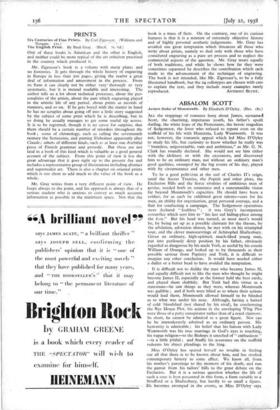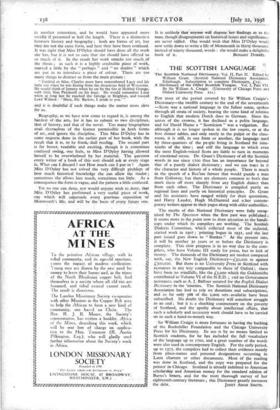ABSALOM SCOTT ALL the trappings of romance hang about James,
surnamed Scott, the charming, impetuous youth, his father's spoilt darling, the white hope of the Protestants, the heroic tragedian of Sedgemoor, the lover who refused to repent even on the scaffold of his life with Henrietta, Lady Wentworth. It was not,' however, the romantic appeal which fed Miss D'Oyley to study his life, but curiosity to know whether he really was " brainless, ungovernable, vain and ambitious," as Mr. G. N. Clark has roundly declared. She would not see him either with the idolisers or with the execrators, and discovered him to be an ordinary man, not without an ordinary man's good qualities, swamped by the big events of his day, played with by circumstance and other men.
To be a good politician at the end of Charles II's reign, amid the Secret Treaties, the Popish and other plots, the Exclusion Bills and the fierce rivalries of ambitious men of genius, needed both an astuteness and a statesmanlike vision far. beyond Monmouth's capacities. He should have been a soldier, for as such he exhibited great talents—care for his men, an ability for organisation, great personal courage, and a flair for conducting a campaign. The Sedgemoor operations . were declared " faultless " ; it was Grey's incompetent cowardice which sent him to " his last sad hiding-place aMong-, the fern." But his head was turned, as most men's would be, by being set up as a possible claimant for the throne, by the adulation, adoration almost, he met with on his triumphal tour, and the clever manoeuvrings of Achitophel Shaftesbury. Given an ordinary, high-spirited, much-liked young man, put into perilously dizzy position by his father, obviously regarded as dangerous by his uncle York, as useful by his cousin William of Orange, and looked up to by thousands as their possible saviour from Papistry and York, it is difficult to imagine any other conclusion. It would have needed either a duller or a better head to have avoided the temptation.
• It is difficult not to dislike the man who became James II, and equally difficult not to like the man who thought he might become James II, especially as the former held the best cards, and played them shabbily. But York had this virtue as a statesman—he saw things as they were, whereas Monmouth was gullible ; and if both were blind as to where their actions would lead them, Monmouth allowed himself to be blinded as to what was under his nose. Although, having a hatred of cold bloodshed (not shared by his rival), he condemning the Rye House Plot, his actions in the enveloping Whig Plot
were those of a petty conspirator rather than of a royal claimant. In short, he cannot be admired as a great figure. Nor can he be immoderately admired as an.-ordinary person. His humanity is admirable ; his belief that his liaison with Lady Wentworth was his true marriage in God's eyes is touching, his vague religion—to the Bishops it smacked of " enthusiasm " is a little pitiful ; and finally his assurance on the scaffold redeems his abject pleadings to the king.
Miss O'Oyley has spared herself no trouble in finding out all that there is to be known about him, and has studied , contemporary history to some effect. We know all, from his mother's parentage to the moment of his death, and run the gamut from his tailors' bills to the great debate on the Exclusion. But it is a serious question whether the life of such a man is best presented in this form, a form suitable to a Strafford or a Shaftesbury, but hardly to so small a figure. He becomes swamped in the events, as Miss D'Oyley says
in another connexion, and he would have appeared more vividly if presented at half the length. There is a distinction between history and -biography ; both are forms of art, but
they are not the same form, and here they have been confused. It was right that Miss D'Oyley should have done all the work she has, but it is not so sure that she should have offered -us so much of it. In the result her work smacks too much, of the thesis ; as such it is a highly creditable piece of work, marred a little by the " perhaps ". and " no doubts " -which are put in to introduce a piece of colour. There are too
many things to distract us from the main picture
" Faithful or false, Charles must have remembered Lucy and his little son when he was fleeing from the disastrous field of Worcester. He would think of Jemmy- when he sat by the fire at Hobbal Grange, with little. Nan Penderell on his knee. He would remember Lucy when at long kit he -reached the George at Brighton, and toasted Lord Wilmot : ' Here, Mr. Barlow, I drink to you."'.
anti it is doubtful_ if such things make the matter more alive
for us. .
Biography,. as we have now come to regard it, is among the hardest of .the- arts, for it has to submit to two disciplines, that of history, and that of the novel. Too many biographies
avail . themselves -of the licence permissible. in _both forms . Of art,„and ignore the; discipline. This Miss D'Oyley has in some respects done in the earlier. part of her. book, with the result that it is, to- be frank,-dull reading. The Second part is far better, readable and exciting, though it is _sOrrietimes confused owing, one feels, to Miss D'Oyley hiving „allowed herself to 'be overwhelmed by , her ,material:. The question every writer of book of this sort should ask at every. Stage is, What can. I_discard.? not How much can I put in ? .Again Miss D'Oyley has not solved the very difficult pkobtem of how much historical 'Knowledge she. can- .a.flOw the reader ; sometimes -She- airman him much, sometimes- too little. As a consequence the form is vague, and the pattern a little confused.
Yet no one can deny, nor would anyone wish, to deny, that Miss D'Oyley has performed a very--useful piece of work, one which will .supersede every . pret;ious exposition 'of Moninouth's life, and will be the basis- of -very future one It is unlikely that anyone -will dispute her-findings as to the man, though disagr bislcirical- issues and significances are never stilled. One would wish that Miss D'Oyley would now settle down to write a life of Monmouth in-thirty thousand, instead of ninety thousand, words : she would make a delightful












































 Previous page
Previous page